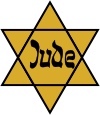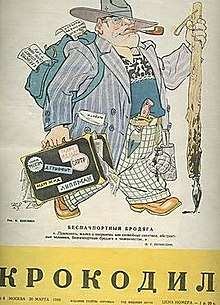Rootless cosmopolitan
| Part of a series on |
| Antisemitism |
|---|
 Part of Jewish history |
|
Antisemitic publications |
|
Opposition |
|
|
Rootless cosmopolitan (Russian: безродный космополит, bezrodnyi kosmopolit) was a pejorative Soviet euphemism widely used during Soviet anti-Semitic campaign of 1948–1953, which culminated in the "exposure" of the non-existent Doctors' plot.[1] The term "rootless cosmopolitan" referred mostly to Jewish intellectuals, as an accusation in their lack of patriotism, i.e., lack of full allegiance to the Soviet Union. The campaign against "rootless cosmopolitans"[2] began in 1946, when Joseph Stalin in his speech in Moscow attacked writers who were ethnic Jews.[3] Historically, the expression was first coined in 19th century by Russian literary critic Vissarion Belinsky to describe writers who lacked Russian national character.[4]
The antisemitic campaign
Beginning
After World War II, the Jewish Anti-Fascist Committee (JAC) grew increasingly influential to the post-Holocaust Soviet Jewry, and was accepted as its representative in the West. As its activities sometimes contradicted official Soviet policies (see The Black Book of Soviet Jewry as an example), it became a nuisance to Soviet authorities. The Central Auditing Commission of the Communist Party of the Soviet Union concluded that instead of focusing its attention on the "struggle against forces of international reaction", the JAC continued the line of the Bund—a dangerous designation, since former Bund members were to be "purged".
During a meeting with Soviet intelligentsia in 1946, Stalin voiced his concerns about recent developments in Soviet culture, which later would materialize in the "battle against cosmopolitanism" (see Zhdanov Doctrine).
Recently, a dangerous tendency seems to be seen in some of the literary works emanating under the pernicious influence of the West and brought about by the subversive activities of the foreign intelligence. Frequently in the pages of Soviet literary journals works are found where Soviet people, builders of communism are shown in pathetic and ludicrous forms. The positive Soviet hero is derided and inferior before all things foreign and cosmopolitanism that we all fought against from the time of Lenin, characteristic of the political leftovers, is many times applauded. In the theater it seems that Soviet plays are pushed aside by plays from foreign bourgeois authors. The same thing is starting to happen in Soviet films.[5]
In 1946 and 1947, the new campaign against cosmopolitanism affected Soviet scientists, such as the physicist Pyotr Kapitsa and the president of the Belorussian Academy of Sciences Anton Zhebrak. They along with other scientists were denounced for contacts with their Western colleagues and support for "bourgeois science".[6]
In 1947, many literary critics were accused of "kneeling before the West", as well as anti-patriotism and cosmopolitanism. For example, the campaign targeted those who studied the works of Alexander Veselovsky, the founder of Russian comparative literature, which was described as a "bourgeois cosmopolitan direction in literary criticism".[7]
1948
In January 1948, the JAC's head, the popular actor and world-famous public figure Solomon Mikhoels, was killed by the Soviet Ministry of Internal Affairs on the Politburo's orders; his murder was framed as a car accident where a truck ran over him as he was taking a walk on a narrow road.[lower-alpha 1] This was followed by eventual arrests of JAC's members and its termination.
The USSR voted for the 1947 United Nations Partition Plan for Palestine and in May 1948, it recognized the establishment of the state of Israel there, subsequently supporting it with weapons (via Czechoslovakia, in defiance of the embargo) in the 1948 Arab–Israeli war. Many Soviet Jews felt inspired and sympathetic towards Israel and sent thousands of letters to the (still formally existing) JAC with offers to contribute to or even volunteer for Israel's defence.
In September 1948, the first Israeli ambassador to the USSR, Golda Meir,[lower-alpha 2] arrived in Moscow. Huge enthusiastic crowds (estimated 50,000) gathered along her path and in and around Moscow synagogue when she attended it for Yom Kippur and Rosh Hashanah. These events corresponded in time with a visible upsurge of Russian nationalism orchestrated by official propaganda, the increasingly hostile Cold War and the realization by the Soviet leadership that Israel had chosen the Western option. Domestically, Soviet Jews were being considered a security liability for their international connections, especially to the United States, and growing national awareness.
With United States becoming the opponent of the Soviet Union by the end of 1948, the USSR switched sides in the Arab–Israeli conflict and began supporting the Arabs against Israel, first politically and later also militarily. For his part David Ben-Gurion declared support for the United States in the Korean War, despite opposition from left-wing Israeli parties. From 1950 on, Israeli–Soviet relations were an inextricable part of the Cold War—with ominous implications for Soviet Jews supporting Israel, or perceived as supporting it.
"About one anti-patriotic group of theatre critics"

A new stage of the campaign opened on January 28, 1949, when an article entitled "About one anti-patriotic group of theatre critics" appeared in the newspaper Pravda, an official organ of the Central Committee of the Communist Party:
An anti-patriotic group has developed in theatrical criticism. It consists of followers of bourgeois aestheticism. They penetrate our press and operate most freely in the pages of the magazine, Teatr, and the newspaper, Sovetskoe iskusstvo. These critics have lost their sense of responsibility to the people. They represent a rootless cosmopolitanism which is deeply repulsive and inimical to Soviet man. They obstruct the development of Soviet literature; the feeling of national Soviet pride is alien to them.[8]
According to the journalist Masha Gessen, a concise definition of rootless cosmopolitan appeared in an issue of Voprosy istorii (The Issues of History) in 1949: "The rootless cosmopolitan ... falsifies and misrepresents the worldwide historical role of the Russian people in the construction of socialist society and the victory over the enemies of humanity, over German fascism in the Great Patriotic War." Gessen states that the term used for "Russian" is an exclusive term that means ethnic Russians only, and so she concludes that "any historian who neglected to sing the praises of the heroic ethnic Russians ... was a likely traitor".[9]
The campaign included a crusade in the state-controlled mass media to expose literary pseudonyms of Jewish writers by putting their real names in parentheses in order to reveal to the public that they were ethnic Jews.[10][11]
Thirteen Soviet Jewish poets and writers, five of them members of Jewish Anti-Fascist Committee, were executed in the Lubyanka Prison in Moscow on August 12, 1952.
Legacy
As a result of the campaign, scores of Soviet Jews were fired from their jobs. In 1947, Jews constituted 18 per cent of Soviet scientific workers, but by 1970 this number declined to 7 per cent, which can still be compared to about 3 to 4 per cent of the Soviet population at that time.[12]
Anything Jewish became suppressed by the Soviet authorities, and even the word Jew disappeared from the media. Many were shocked to find a Yiddish verse (sung by Mikhoels) cut out from the famous lullaby in the Soviet classic movie Circus ("Tsirk", 1936), known by heart by millions and still very popular in post-war Soviet cinemas.
A historian of Zionism, Walter Laqueur, noted: "When, in the 1950s under Stalin, the Jews of the Soviet Union came under severe attack and scores were executed, it was under the banner of anti-Zionism rather than anti-Semitism, which had been given a bad name by Adolf Hitler."[13]
See also
Notes
- ↑ According to the historian Gennady Kostyrchenko, recently opened Soviet archives contain evidence that the assassination was organized by L. M. Tsanava and S. Ogoltsov of the Ministry of Internal Affairs.
- ↑ At the time, her last name was Myerson. She changed it to Meir in 1956.
References
- ↑ Azadovskii K, Egorov B (2002). "From Anti-Westernism to Anti-Semitism". Journal of Cold War Studies. MIT Press. 4 (1): 66&ndash, 80.
- ↑ Figes, Orlando (2007). The Whisperers: Private Life in Stalin's Russia. New York City: Metropolitan Books. p. 494. ISBN 0-8050-7461-9.
- ↑ Jeff Greenfield (3 August 2017). "The Ugly History of Stephen Miller's 'Cosmopolitan' Epithet: Surprise, surprise—the insult has its roots in Soviet anti-Semitism". Politico.
- ↑ Orlando Figes The Whisperers: Private Life in Stalin's Russia, 2007, ISBN 0805074619, page 494.
- ↑ "Stalin On Art and Culture".
- ↑ Bibikov, V. (November 1988). "Lysenko Foe Anton Zhebrak Rehabilitated". Science & Technology – USSR: Science & Technology Policy (Report). Foreign Broadcast Information Service. pp. 70–71.
- ↑ Dobrenko, Evgeny; Tihanov, Galin (2011). A History of Russian Literary Theory and Criticism: The Soviet Age and Beyond. Pittsburgh: University of Pittsburgh Press. pp. 171–173. ISBN 978-0-8229-4411-9.
- ↑ Pinkus, Benjamin (1984). The Soviet Government and the Jews 1948-1967: A Documented Study. Cambridge: Cambridge University Press. pp. 183–184. ISBN 0-521-24713-6.
- ↑ Gessen, Masha (2005). Two Babushkas. Bloomsbury. p. 205. ISBN 0-7475-7080-9.
- ↑ Yaacov Ro’i (2010). "Anticosmopolitan Campaign". YIVO Institute for Jewish Research. Retrieved February 24, 2013.
- ↑ Ree, Erik van (2004). The Political Thought of Joseph Stalin: A Study in Twentieth Century Revolutionary Patriotism. New York: Routledge. p. 205. ISBN 0-7007-1749-8.
- ↑ Paul Johnson, The History of the Jews. London: Weidenfeld & Nicolson, 1987
- ↑ Walter Laqueur Dying for Jerusalem: the past, present and future of the Holiest City. Naperville: Sourcebooks, Inc., 2006 ISBN 1-4022-0632-1; p. 55
External links
- "About one antipatriotic group of theater critics", Pravda article
- "From Anti-Westernism to Anti-Semitism" by Konstantin Azadovskii and Boris Egorov in Journal of Cold War Studies, 4:1, Winter 2002, pp. 66–80
- http://www.tandfonline.com/toc/cerh20/17/3 "Cosmopolitanism: The End of Jewishness?" Michael L. Miller and Scott Ury in European Review of History, 17:3, 2010, pp. 337–359.
- Michael L. Miller and Scott Ury, eds., Cosmopolitanism, Nationalism and the Jews of East Central Europe. ISBN 978-1138018525